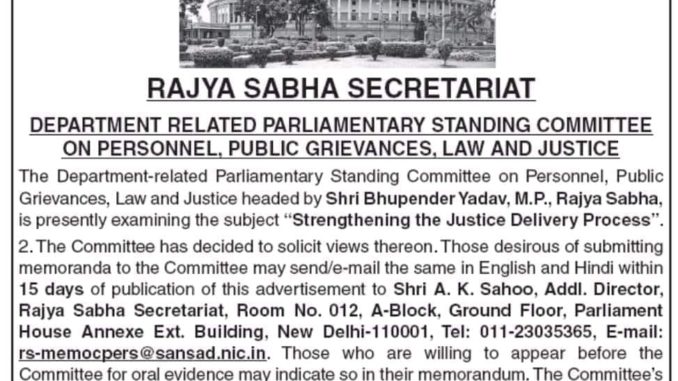
With reference to seeking recommendations by Honourable Committee members on the captioned subject vide Press Release dated 3rd August 2018, through this Open letter I present my recommendations to the Honourable Parliamentary Committee on the following aspects. I humbly request the committee to allow Men’s Right Activists to depose and tender oral evidence before the Committee, backed with facts and figures in support of the following statements and observations
- Pendency of cases in various Courts
The National Mission for Delivery of Justice and Legal reform, aiming for ‘Towards Timely Delivery of Justice to All’ while identifying the top two bottlenecks mentioned the following:
Studies have shown that cases under certain statutes and areas of law are choking the dockets of magisterial and specialized courts, and the same have been identified as follows:
- Matrimonial cases.
- Cases under Section 498A of the Indian Penal Code, 1860.
As a remedy the following was suggested
Categorization and Clubbing of Cases
Clubbing cases which raise same/similar issues is a healthy practise which helps in block disposal of such cases. Cases raising the same point, when initiated in any Court, must be first listed for early hearing and disposed off before the flood actually invades the Court. The tendency to allow such batch-cases to accumulate into hundreds should be deplored. The practise of grouping should be introduced whereby cases should be assigned a particular number or identity according to the subject and statute involved. In fact, further sub-grouping is also possible. To facilitate this process, standard forms must be devised which lawyers have to fill up at the time of filing of cases.
In this connection I would like to refer to the Hon’ble Apex Court Judgement in Rajesh Sharma vs. The State of UP dated 27 July 2018 wherein the Hon’ble Court had also gone through the National Crime Records Bureau Report and taken a note of huge number of pendency of cases in just IPC Section 498A. While taking note of the above, the Hon’ble Apex Court has formulated directions and at para 19(vi) stated as follows
- vi) It will be open to the District Judge or a designated senior judicial officer nominated by the District Judge to club all connected cases between the parties arising out of matrimonial disputes so that a holistic view is taken by the Court to whom all such cases are entrusted; and appearance of all family members and particularly outstation members may not be required and the trial court ought to grant exemption from personal appearance or permit appearance by video conferencing without adversely affecting progress of the trial.
Basis the above as well as the view of the Hon’ble Apex Court I would recommend the following to reduce pendency of cases:
> To formulate the guidelines for the Hon’ble Courts to compulsorily club all such cases wherever it can be and hear the all such connected cases as single by taking a holistic view;
> Exemption from Personal appearances should be granted as a rule and not as an exception. Permitting use of technology including video conferences should be encouraged
> To formulate strict guidelines on giving adjournments on petty reasons and restrict the number of adjournments every case before Hon’ble Courts to save its precious time;
> Strict compliance of Section 468 of Crpc, 1973 regarding limitation of time for filing of cases
> Speed up process of filling the vacant post of Hon’ble Judges in various Courts and also to take steps towards appointment of additional Judges to reduce pendency of cases
- Selection/Promotion and training of Judges/Judicial officers
There is a need for special training to sensitize the existing and new Judges on the basis of Gender. The Constitution does not allow anyone to discriminate the human on the basis of Gender in any sphere of his/her living. Both the gender should be given equal treatment by Hon’ble Judges while delivering justice to the litigant before them.
III. ICT support to subordinate Judiciary
In this regard, I recommend to formulate a mechanism for instant communication of Upper Court orders to Lower Courts so that Lower Courts can take note of that orders in relevant cases before them to provide real justice to the litigants.
I would take this opportunity, to thank the Hon’ble Committee, for seeking recommendations on “Strengthening the Justice Delivery System” and would humbly request the Committee to allow Men’s Right Activists to depose and tender oral evidence before the Committee, backed with facts and figures in support of above statements and observations.
Leave a Reply